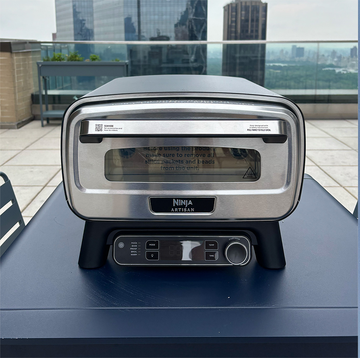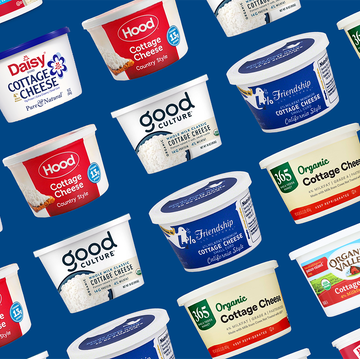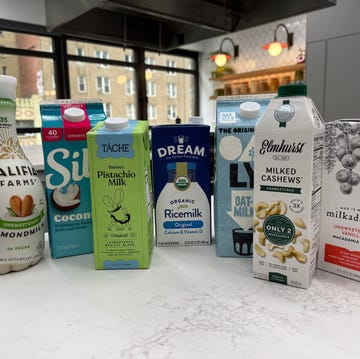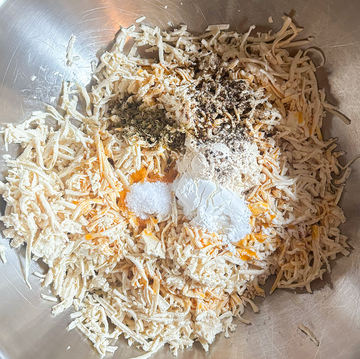The hottest fall trends include furry shoes, Donald Trump, and food poisoning. How unfortunate. Yes, from cucumbers to nut butters, Costco to Chipotle, the foodborne illness headlines just keep on coming.
Even today, Boston College updated their count to more than 140 students who are sick after eating at a local Chipotle, and earlier this week the U.S. Food and Drug Association (FDA) said it's back to square one in the investigation of the Costco chicken salad that sickened 19 people and made all of us afraid to eat celery.
All of this hubbub has us wondering: What in the world is going on with our food?
The Reality of Food Poisoning and Recalls
"My initial comment would be that it always happens," says Benjamin Chapman, PhD, associate professor and food safety extension specialist at North Carolina State University. "We see about 48 million cases of foodborne illnesses a year in the U.S., and we have incidents weekly of outbreaks in restaurants — whether it was contaminated at the restaurant or whether it came from a supplier — or recalls and outbreaks that are linked to foods that people buy in grocery stores and consume in their home."
Dr. Chapman, who's been deeply involved in the food safety world for the past 15 years, says that while there will be spikes in attention, "we really always have a certain amount of outbreaks that are going on."
There are plenty of opportunities for pathogens, such as E. coli and Salmonella, to infect food along the entire production and preparation chain — from soil to table, says Jeff Nelken, BS, MA, a food safety/HACCP expert.
"Was the water contaminated? Are there wild animals nearby? Do the workers wash their hands after they relieve themselves on the farms?" he lists. "The government is definitely trying to teach the small farmers about washing facilities, needing bathrooms with hot water and paper towels in the field — things we take for granted. I always say, when you cut corners, it's the customer getting the short end of the corner cut."
Not to mention some foods are just more difficult to keep uncontaminated than others. For instance, ready-to-eat food doesn't require a "kill step," i.e. a step during preparation that kills harmful bacteria, explains Darin Detwiler, MA Ed, adjunct faculty at Northeastern University and senior policy coordinator of STOP Foodborne Illness, the leading national nonprofit health organization dedicated to the prevention of illness and death from foodborne pathogens.
"When you have a pathogen in meat, you'd typically be cooking meat — hopefully at the right temperature — so if there were pathogens, then they'd be killed," he says. "But that's not the way it is with produce."
It's much easier said than done when it comes to stopping food contamination, so some foodborne illness outbreaks are to be expected, Detwiler says.
"Every single food we eat — everything — can, is, has been, and will be contaminated with pathogens," he says. "Even if we have the world's greatest-of-all-time food safety policies, there will still always be recalls and outbreaks."
Which is why, ultimately, this season's seemingly endless outbreaks and recalls may have more to do with the fact that they involve nationally recognized brands, says Chapman: "It's not that food is getting more — or less — safe, it's that we're getting better at finding outbreaks, and sometimes that makes the news."
And Then There's Chipotle
Even though outbreaks and recalls are a normal part of the food production and service industries, that isn't an excuse for negligent food safety practices. Detwiler and Nelken were both floored by Chipotle's response to its E. coli (and now norovirus) outbreak issues.
"Here's a company that started the same exact year as the Jack in the Box E. coli outbreak in 1993, which is referred to as the 9/11 in the food industry," says Detwiler. Four children died during that outbreak — including Detwiler's own son, Riley, which is what prompted Detwiler to dedicate his career and life to food safety reform.
"Chipotle's response was, 'Look at what we're doing now.' What were you not doing before?" he says. "Now you're deep cleaning? Well, shouldn't you be doing a deep cleaning in all of your restaurants?"
"They should have done everything they're doing now from day one," Nelken adds. "And they should have put their crisis management [and] food safety program into the start of their operation!"
But it's not a total shock that companies like Chipotle haven't been focusing on food safety as much as they probably should when it isn't a priority in other parts of everyday life, Detwiler says.
"We have a society that, even on television shows (like Grey's Anatomy and Chicago Med), we expect to see doctors cleaning their hands before surgery," he says. "But have you ever seen a cooking show where someone washed their hands? So what message is that telling not only consumers but those who are working in the food industry? We're saying that surgery has health implications, but food has no health implications whatsoever."
What You Can Do
When an outbreak occurs, regulatory groups, such as the U.S. Department of Agriculture (USDA), Centers for Disease Control and Prevention (CDC), and the FDA, move into action right away.
"There's a lot of work that goes into when an outbreak does happen," Chapman explains. "Exactly what caused it is often like a detective game. We have to piece together all the information of what happened to figure out what needs to be done, and people are literally doing that every day in the world of safety."
And while there's little we can do during those outbreak investigations, Chapman says everyone can still play a role when it comes to keeping foodborne illnesses at bay.
"Consumers are partners in food safety and in terms of what they can do when they purchase food, when they transport it, when they cook it — just following [safe] food practices," he says.
Use these resources to stay informed and take charge of your own food safety:
- Read these guides from the U.S. Department of Health & Human Services, which explains exactly how to keep food clean and safe at home and protect your family from food poisoning.
- Visit Foodsafety.gov here to see the latest information about ongoing food investigations and recalls.
- Subscribe to receive email alerts about developing outbreaks and recalls.
Follow Delish on Instagram.













